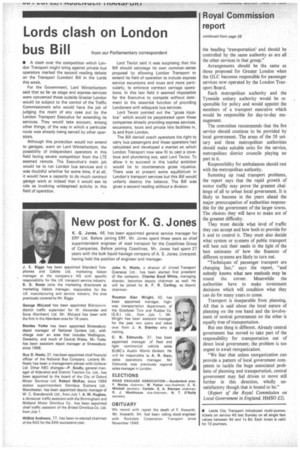Lords clash on London
Page 40

If you've noticed an error in this article please click here to report it so we can fix it.
busBill from our Parliamentary correspondent
• A clash over the competition which London Transport might bring against private bus operators marked the second reading debate on the Transport (London) Bill in the Lords this week.
For the Government, Lord Winterbottom said that so far as stage and express services were concerned those outside Greater London would be subject to the control of the Traffic Commissioners who would have the job of judging the merit of any case put by the London Transport Executive for extending its services. They would take account, among other things, of the way in which a particular route was already being served by other operators.
Although this protection would not extend to garages, went on Lord Winterbottom, the possibility of independent operators in this field facing severe competition from the LIE seemed remote. The Executive's main job would be to run London bus services and it was doubtful whether for some time, if at all, it would have a capacity to do much contract garage work or indeed that it would see its role as involving widespread activity in this field of operation. Lord Teviot said it was surprising that the Bill should sabotage its own common-sense proposal by allowing London Transport to extend its field of operation to include express service excursions and tours and more particularly, to embrace contract carriage operations. In this last field it seemed impossible for the Executive to compete without detriment to the essential function of providing Londoners with adequate bus services.
Lord Teviot pointed out the "gross injustice" which would be perpetrated upon those companies already providing express services, excursions, tours and private hire facilities in, to and from London.
The Bill denied coach operators the right to carry bus passengers and these operators had calculated and developed a market on which London Transport now saw fit to cast a covetous and plundering eye, said Lord Teviot. To allow it to succeed in this lustful ambition would be to countenance gross injustice. There was at present some equilibrium in London's transport services but this Bill would unfairly destroy the balance. The Bill was given a second reading without a division.
























































































































































